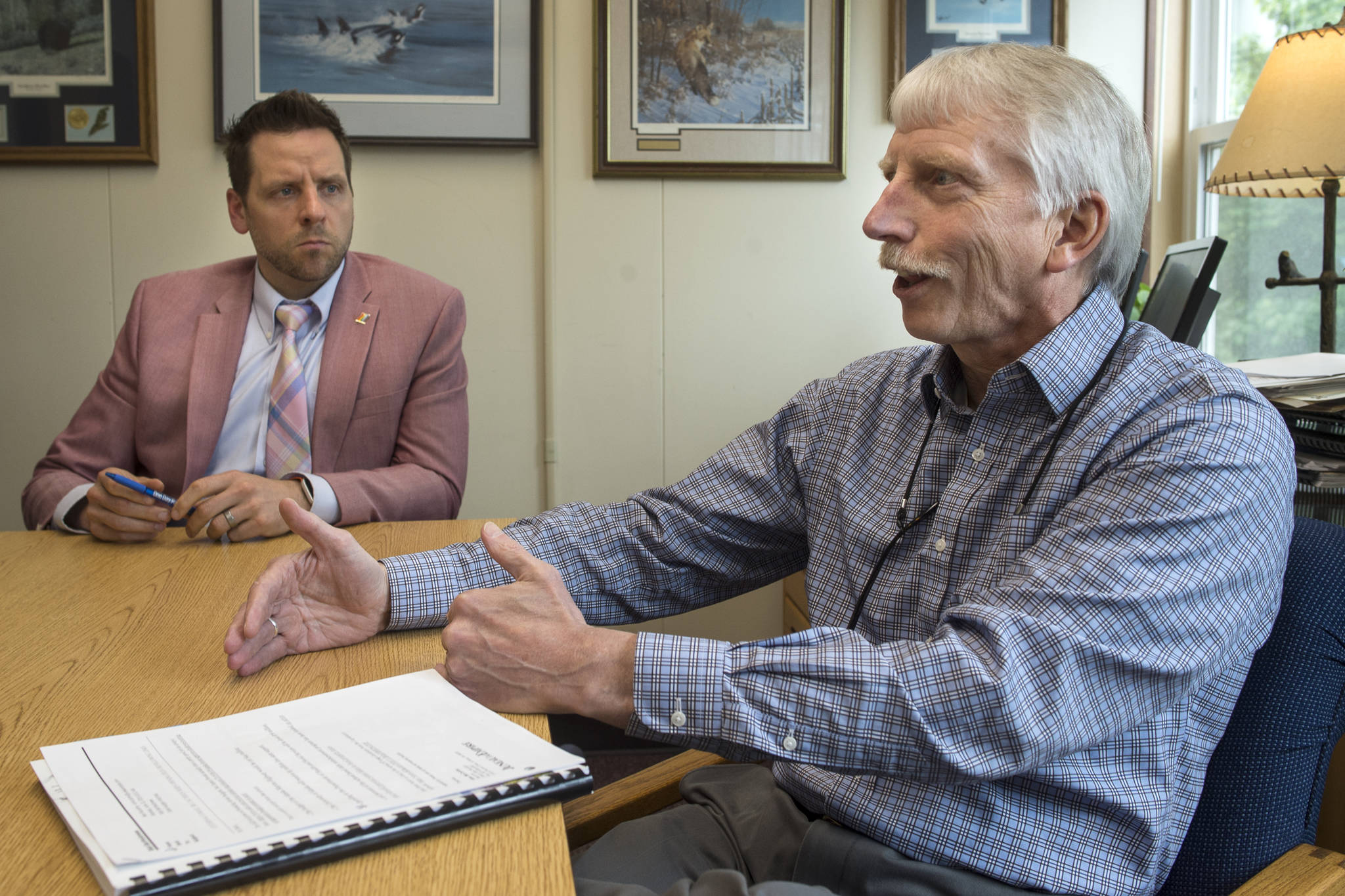The Alaska Legislature’s budget spares municipalities some of the costs that would have come down under the governor’s budget proposal — but uncertainty still hangs over city governments and school districts throughout the state.
With a unanimous vote Monday, the Alaska Senate approved a budget that rejects many of Gov. Mike Dunleavy’s proposed cuts. The budget now heads to Dunleavy’s desk, where he can still veto part or all of it.
Nils Andreassen, the executive director of the Alaska Municipal League, said via email Monday that the Legislature’s budget is “very supportive of local governments, economic development and the resilience of Alaskans.”
A few blocks down Seward Street from the Capitol, those at City Hall in Juneau are still watching the Capitol anxiously. City and Borough of Juneau Finance Director Bob Bartholomew (who is set to retire this summer) and incoming Finance Director Jeff Rogers said in an interview Monday that they have a couple main concerns.
First of all, they know that Dunleavy can veto anything in the budget, so even the items they like in the Legislature’s budget aren’t set in stone, Bartholomew and Rogers said.
[An irritating stunt or a ‘kick in the shins’? Senator tries to spark motion on budget]
One of the key items on their minds is the fact that the Legislature restored funding for the state’s school debt reimbursement program. The program, which helps schools fund building and repair projects, would have taken a huge hit under Dunleavy’s proposal, but the Legislature kept the funding in.
Juneau City Manger Rorie Watt said earlier this session that cutting the school bond debt reimbursement program would directly cost the city $7.1 million, and that the city would have to cut services, raise taxes and pull from savings to deal with the cuts. Rogers agreed, saying a Dunleavy veto on the program’s funding would directly result in Alaskans paying higher local taxes.
Rogers said they hope the governor’s vetoes aren’t too extensive, if they happen.
“I inherit the responsibility to create circumstances where an economy thrives,” Rogers said, “and we can’t do that in the face of a state that’s working against us. Municipalities talk all the time about maximum local control, and that’s all we want. Let us pull the levers to have a maximally productive economy for everybody who lives here.”
Juneau School District Superintendent Bridget Weiss said the fully funded school bond debt reimbursement was probably the biggest bit of good news in the Legislature’s budget. Still, with the end of the fiscal year looming and still no firm statewide education funding in place, school districts are in a frustrating spot, she said.
“No business would be expected to run this way in most other settings, yet we’re being asked to do that,” Weiss said in a phone interview. “Once we have a final decision, then we will take a look and see what we might need to do.”
Education funding is also still an unknown. Last year, the Legislature voted to guarantee education funding for the fiscal year starting July 1, 2019. While previous Attorney General Jahna Lindemuth ruled that that move was constitutional, current Attorney General Kevin Clarkson has issued an opinion that he believes a current Legislature cannot guarantee funding for a future Legislature.
Members of the Legislature have held their ground on that funding, and it’s possible that the Legislature and administration might end up in a lawsuit over the issue. The forward funding was meant to make the budget situation more stable for school districts, but the conflict over it has raised more questions than answers.
“It seems to be an annual situation, and it’s getting worse, not better,” Weiss said. “It’s taking longer, it’s getting more complex.”
The Legislature’s cuts
There are a couple of other cuts in the Legislature’s budget that have Bartholomew’s attention. The cut of about $40 million for the Alaska Marine Highway System is a concern, Bartholomew said. While it doesn’t directly impact the CBJ budget, it could have an overall negative impact on the region’s economy, he said. Southeast Conference Executive Director Robert Venables said in an interview Tuesday that it’s hard to predict just what those impacts will be without knowing what the ferry schedule will be this offseason.
The Legislature approved a cut of more than $100 million to the Department of Health and Social Services, according to Legislative Finance Division documents. Those cuts will directly impact city-owned Bartlett Regional Hospital.
BRH CEO Chuck Bill was out of town this week and unavailable for comment, but he told the House Finance Committee in March that BRH operated at a $100,000 loss last year, so money is already tight. Cuts to Medicaid in particular could translate to major costs to the hospital, Bill said at the time.
• Contact reporter Alex McCarthy at amccarthy@juneauempire.com. Follow him on Twitter at @akmccarthy.

